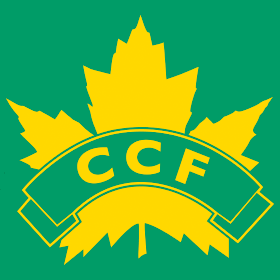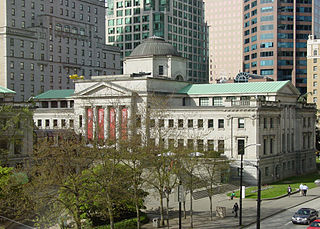| Harold Edward Winch | |
|---|---|
| Member of the Legislative Assembly of British Columbia | |
| In office 1933–1953 | |
| Constituency | Vancouver East |
| Member of Parliament | |
| In office 1953–1972 | |
| Preceded by | Angus MacInnis |
| Succeeded by | Paddy Neale |
| Constituency | Vancouver East |
| Personal details | |
| Born | 18 June 1907 Loughton, England |
| Died | 1 February 1993 (aged 85) White Rock, British Columbia |
| Political party | Co-operative Commonwealth Federation |
| Spouse(s) | Dorothy Ada Hutchinson, May 1929- Oct 1974 Jessie Margaret Frost, May 1981- Feb 1993 |
| Relations | Ernest Edward Winch (father) |
| Occupation | electrician |
Harold Edward Winch (18 June 1907 – 1 February 1993) was a Canadian politician active with the Co-operative Commonwealth Federation (CCF) and its successor, the New Democratic Party (NDP). [1]

The Co-operative Commonwealth Federation (CCF) was a social-democratic and democratic socialist political party in Canada. The CCF was founded in 1932 in Calgary, Alberta, by a number of socialist, agrarian, co-operative, and labour groups, and the League for Social Reconstruction. In 1944, the CCF formed the first social-democratic government in North America when it was elected to form the provincial government in Saskatchewan. In 1961, the CCF was succeeded by the New Democratic Party (NDP). The full, but little used, name of the party was Co-operative Commonwealth Federation (Farmer-Labour-Socialist).
Winch was leader of the British Columbia CCF from 1938 to 1953, and Leader of the Opposition from 1941. He was called "the best leader of the Opposition that has ever been" by Premier W.A.C. Bennett .
The New Democratic Party of British Columbia is a social-democratic provincial political party in British Columbia, Canada, which currently governs the province, and previously governed from 1972 to 1975, and then again from 1991 to 2001. Following the 2017 provincial election in British Columbia, the party formed a minority government via a confidence and supply agreement with the British Columbia Green Party, following the defeat of Christy Clark's British Columbia Liberal Party government by a confidence vote in the legislature.
The Leader of the Opposition in British Columbia is the MLA in the Legislative Assembly of British Columbia who leads the political party recognized as the Official Opposition. This position generally goes to the leader of the largest party in the Legislative Assembly that is not in government.

The premier of British Columbia is the first minister, head of government, and de facto chief executive for the Canadian province of British Columbia. Until the early 1970s the title prime minister of British Columbia was often used. The word premier is derived from the French word of the same spelling, meaning "first"; and ultimately from the Latin word primarius, meaning "primary".
Winch was active during the relief camp strike in Vancouver that precipitated the On-to-Ottawa Trek in 1935, acting as a liaison between unemployed protesters and the government. He performed the same role as a new MLA in 1938, and assisted the police in ending a month-long occupation at the Vancouver Art Gallery on what became known as "Bloody Sunday."
The Relief Camp Workers' Union (RCWU) was the union into which the inmates of the Canadian government relief camps were organized in the early 1930s. It was affiliated with the Workers' Unity League, the trade union umbrella of the Communist Party of Canada. The organization is best known for organizing the On-to-Ottawa Trek during the Great Depression.

The On-to-Ottawa Trek was a long journey where a thousand unemployed men protested the dismal conditions in federal relief camps scattered in remote areas across Western Canada. The men lived and worked in these camps at a rate of twenty cents per day before walking out on strike in April 1938. After a two-month protest in Vancouver, British Columbia, camp strikers voted to bring their grievances to the federal government. The Great Depression crippled the Canadian economy and left one in nine citizens on relief. The relief, however, did not come free; the Bennett Government ordered the Department of National Defence to organize work camps where single unemployed men were used to construct roads and other public works at a rate of twenty cents per day. The poor working and living conditions led to general unrest in the camps.

The Vancouver Art Gallery (VAG) is the fifth-largest art gallery in Canada, and the largest in Western Canada. It is located at 750 Hornby Street in Vancouver, British Columbia. Its permanent collection of about 11,000 artworks includes more than 200 major works by Emily Carr, the Group of Seven, Jeff Wall, Harry Callahan and Marc Chagall.
Like other CCFers (such as Grace and Angus MacInnis), [2] Winch and the BC CCF supported the internment of Japanese Canadians during World War II. Decades later, he conceded that this position was wrong.
Winona Grace MacInnis was a socialist Canadian politician. She was the first woman from British Columbia elected to the House of Commons of Canada, as well as the first wife of a former Canadian Member of Parliament to be elected to the House of Commons in her own right, rather than by directly succeeding her husband in a by-election following his death.
Angus MacInnis was a Canadian socialist politician and parliamentarian.
Japanese Canadians are Canadian citizens of Japanese ancestry. Japanese Canadians are mostly concentrated in Western Canada, especially in the province of British Columbia, which hosts the largest Japanese community in the country with the majority of them living in and around Vancouver. In 2016, there were 121,485 Japanese Canadians throughout Canada.
An electrician by trade, Winch joined the CCF at its founding. He was first elected to the British Columbia Legislative Assembly in the 1933 provincial election as the Member of the Legislative Assembly (MLA) for Vancouver East. He became leader of the party following the 1937 general election and leader of the opposition in 1941. The CCF emerged from the 1952 provincial election with only one less seat than the British Columbia Social Credit Party. Social Credit formed a minority government, but was defeated in a motion of no confidence in March 1953. Winch opposed holding a new election, arguing that the CCF was able to form a new government. When the Liberal Party announced that it would not support a CCF government, a new election was called.
A Member of the Legislative Assembly (MLA), or a Member of the Legislature (ML), is a representative elected by the voters of a constituency to the legislature or legislative assembly of a sub-national jurisdiction.
Winch stepped down as party leader, and entered federal politics. He was elected to the House of Commons of Canada in the 1953 federal election as the Member of Parliament for Vancouver East.

The House of Commons of Canada is a component of the Parliament of Canada, along with the Sovereign and the Senate. The House of Commons currently meets in a temporary Commons chamber in the West Block of the parliament buildings on Parliament Hill in Ottawa, while the Centre Block, which houses the traditional Commons chamber, undergoes a ten-year renovation.

Vancouver East is a federal electoral district in British Columbia, Canada, that has been represented in the House of Commons of Canada since 1935. The riding of Vancouver East is the poorest in Canada with a median individual income of $24,374 (2010).
Winch survived the 1958 federal election that almost wiped the CCF out, and remained with the party as it transformed into the New Democratic Party in 1961. After winning seven successive elections as an MP, he retired from the House of Commons at the 1972 federal election.
Harold Winch's father, Ernest Edward Winch was also a CCF MLA from 1933 until his death in 1957.
